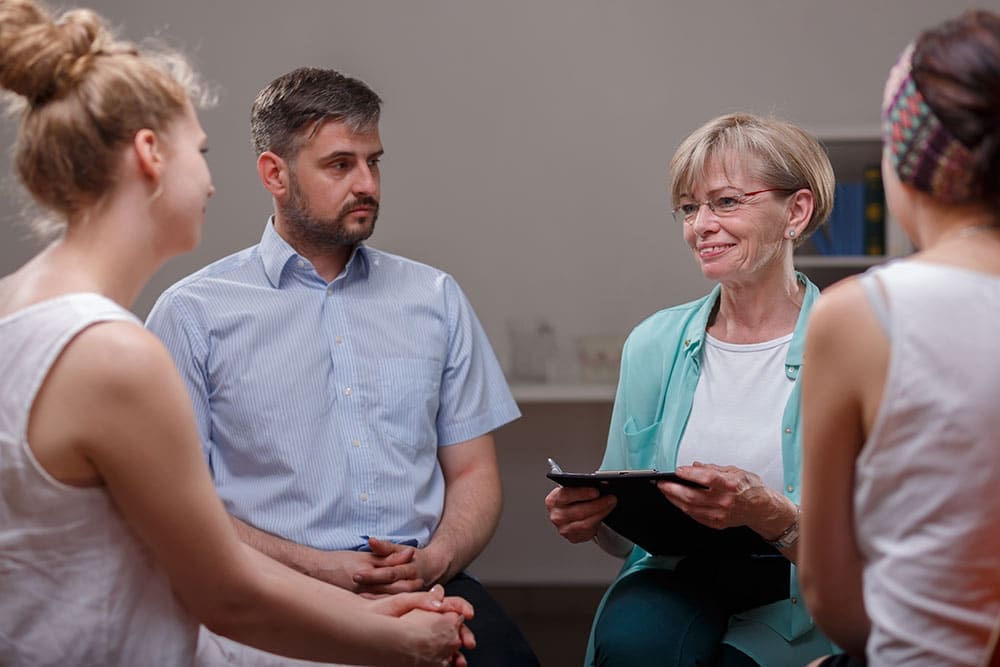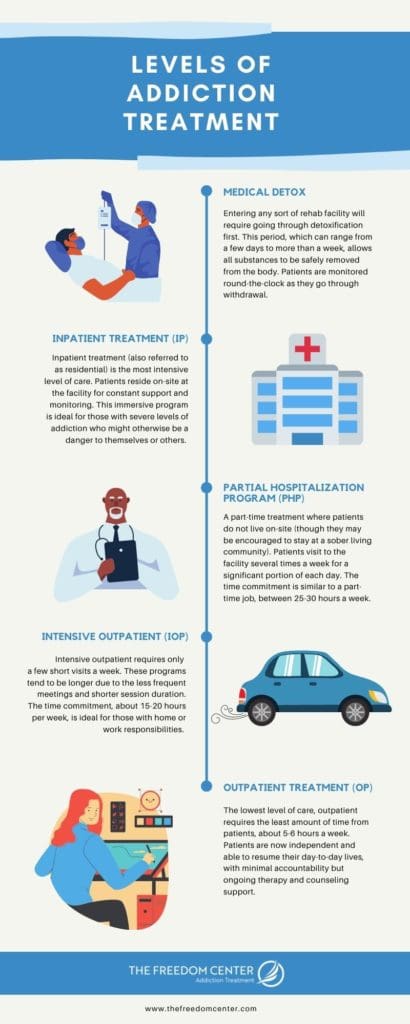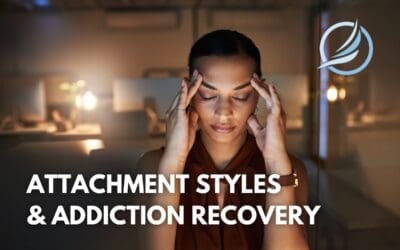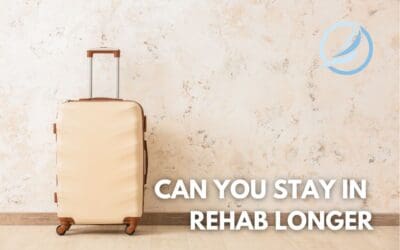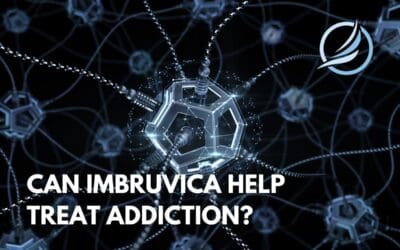Looking for addiction treatment that fits your schedule? Consider a partial hospitalization program (PHP) or intensive outpatient program (IOP). Both offer flexibility and fewer restrictions on patients while still providing access to invaluable medical and psychiatric support. In most cases (it can vary depending on the rehab center), either of these programs allows you to stay at your current place of residence, continue going to work, and otherwise maintain your current schedule and lifestyle with only moderate disruption. While both PHP and IOP are fantastic options that make going to rehab more practical, these programs have noticeable differences that can end up making a big impact on your odds of recovery.
The Differences Between PHP and IOP Treatment
At a glance, these two part-time rehab options might seem interchangeable. Neither involve the (often costly) requirement to live onsite at the facility, allowing you to maintain more freedom and independence. Both give you access to physicians, therapists, and medication if needed. Technically, the difference between PHP and IOP is simply the time committment (which is discussed more in-depth in the sections below). However, the difference of a few hours can translate to differences in the amount of support, accountability, and potential to backtrack.
It’s crucial that you choose an addiction program that will be the most effective—not the most convenient. Ultimately, determining whether PHP or IOP is better for you will be determined by:
- Your budget
- The severity of your addiction
- Whether or not you have been to rehab before
Why Are There So Many Different Treatment Options?
Nowadays, there are many different options (and a lot of abbreviations) to choose from for addiction treatment: IP, PHP, IOP, OP. These four programs represent the spectrum of addiction treatment, and range from the most intensive and comprehensive care, inpatient (IP), to the mildest and least-intensive, outpatient (OP). Think of these different treatment options as steps. With each one, patients build upon the skills they learned previously, strengthening their relapse prevention skills and building a stronger foundation for resisting temptation.
Further, because greater independence means more opportunities to fall into old ways, a recovering addict would ideally begin recovery at the most intense level of the spectrum and eventually move their way through the lower levels of care. As they do so, patients will gain more freedom and spend less time in the facility but in a controlled and thoughtful manner that maximizes their long-term success. However, addiction is not one-size-fits-all so it’s not always necessary for a person to go through all the levels of treatment. As we’ll explore further, many find PHP and IOP to be effective starting points that serve them better than traditional residential treatment would and are able to resolve their addiction without additional treatment afterward.
What is PHP?
PHP is an abbreviation for partial hospitalization program. This type of addiction treatment program is more intensive than IOP (intensive outpatient) but less so than full inpatient or residental rehab. Compared to IOP, partial hospitalization requires more visits and sessions per week. This commitment is comparable to that of a residential recovery program, but unlike tradition rehab, in a PHP program the patient does not reside onsite at the facility during their treatment. They have the ability to choose their own housing accommodations.
How Does PHP Treatment Work?
PHP typically requires an average of 5 visits a week. These visits can range from 4 up to 8 hours long depending on the needs of the patient.
PHP can be paired with other activities besides medical and psychiatric attention so as to better guarantee that the program will be successful, which is in fact highly recommended. As patients seem to be at a vulnerable stage of their transition, every option available to help improve mental and even physical health should be considered, especially ones that go beyond therapy sessions.
What Are The Benefits of PHP?
Each body processes substance abuse in different ways, and many factors dictate which kind of treatment is best, such as level of addiction, family history, other psychiatric conditions, lifestyle, and much more. Rushing through addiction treatment faster doesn’t mean you’ll recover sooner. Quite the contrary as it can actually reduce your treatment’s effectiveness.
Partial hospitalization is the perfect next step for anyone who has just left rehab or residential treatment but doesn’t feel “stable” yet. As an intermediary between residential and outpatient treatment, patients still have a significant amount of support from the facility, but can now access the outside world again. PHP can help patients better adjust to the transition back to their usual routine.
Further, too much freedom too soon can be detrimental to a recovering addict. Going straight from inpatient treatment straight to outpatient can put them at greater risk of fall back into old habits. The time commitment of PHP provides much-needed structure which plays an important role in reducing the likelihood of relapse.
Who Is PHP Best For?
While you can go through detox with an intensive outpatient program, PHP gives you greater access to medical staff which allows for better monitoring of your condition. A partial hospitalization program is an ideal choice for those who:
- Completed residential treatment but still have a higher chance of relapsing
- Faced severe episodes of addiction and/or overdose and have difficulty managing cravings
- Are still undergoing withdrawal symptoms and may need further detoxification services
What is IOP?
IOP stands for intensive outpatient program. It is one of several kinds of outpatient treatment available for recovering addicts. IOP provides patients with medical and psychological help but with minimal time commitment that allows patients to return to their normal lives such as working or caring for children. In this program, patients only need to go to rehab or a hospital of their choice for treatment sessions, such as counseling, therapy, relapse prevention skills, and any additional services provided that the patient might be recommended to or choose to be a part of.
How Does IOP Treatment Work?
Intensive outpatient requires only a few, short visits a week, usually nine hours a week which are divided into three sessions. The number of sessions and hours are adaptable, as they are decided based on the diagnosis of the patient, and will change as the patient improves and progresses. However, because the treatment is not continuous like it is in the inpatient program, IOP tends to take longer than inpatient treatment to be completed. Nonetheless, this in no way alters the effectiveness of the program, and there have been multiple studies proving that they are equally successful when correctly prescribed and followed.
Apart from individual therapy and counseling, IOP treatment is also comprised of other methods to ensure full recovery from addiction. Group activities such as group sessions can be of great help as a former addict gets support from people going through the same changes as them. This would help prevent feelings of loneliness and isolation, and can also help a patient better understand themselves and their process through other people’s advice, experiences, and insights.
Who is IOP Best For?
IOP treatment is recommended for people that have gone through the acute stage of withdrawal and do not require round-the-clock monitoring. It is also recommended for those that do not meet the diagnostic criteria for inpatient treatment and only suffer from moderate to mild addiction.
This program is the preferred choice among those who want to start getting back to their usual routine since patients can stay in their own homes and would have more free hours in their day. However, it is important to be realistic about your medical and psychological needs and just how much freedom you can handle. While you may be eager to be “done” with rehab, if you do not feel confident that you have a handle on your addiction, it would be best to enroll in a higher level of care such as PHP.
IOP is not recommended for those who:
- Would be returning to an environment that would trigger cravings
- Would be exposed to situations or people that might encourage substance abuse
- Have difficulty arranging transportation to go back to the facilities for sessions
How Do I Know Which Program Is Best?
Choosing the right program can be downright confusing (in fact, some people might not even be too sure of when or how to get help). With all the letters, acronyms, and industry jargon, it can be difficult to figure out where to even start. To set you on the right path, here are a few things to keep in mind when searching for the best addiction treatment program for you:
Time Commitment
There are short-length program options as well as longer alternatives. The shortest length programs you can find will last at least 30 days and are considered short-term residential treatments – these would be the ones including therapy and/or counseling, not just the detoxification process since that would not be actual treatment. The long-term options can go from 90 to even 200 days, depending on the service setting and the severity of the addiction of the patient.
Affordability
Another thing to consider is your financial condition. There are many ways to pay for treatment. Insurance is required to cover mental and behavioral health services since those are classified as essential health benefits. You can also find out if you qualify for Medicaid or Medicare, which covers specific services. If you can’t count on any of those choices, however, this does not mean you’re out of options. Most programs offer payment plans or allow for credit card payment. Additionally, there are grants and loans offered by institutions, as well as crowdfunding.
Lifestyle
This brings us to our next, most important point: service setting. This aspect of the program tends to be influenced by the patient’s lifestyle and limitations, which step of the recovery process they are in, and pragmatic day-to-day factors such as lifestyle, need to work, study, or take care of family members, etc.
Treatment options largely fall under two categories: inpatient and outpatient. These define whether or not the patient would have to stay in the facilities intermittently or continuously and will be the easiest way to hone in on the recovery model that works best for you. However, it’s important to keep in mind that there’s a difference between what will be effective, and what is most conveient.
People who are going through an intense addiction or that are too much of a risk to others or themselves are often recommended residential treatment. Once that is complete, some might not feel ready to go back out there and start their lives from scratch yet, feeling they need to gradually transition into it. Some, however, might not even qualify for or need inpatient treatment. Whichever might be the case, there are other options for outpatient treatment for them, such as IOP and PHP.
What Else Do I Need Besides Detox?
The bare minimum required for true recovery is detox, medical treatment, therapy, and counseling. Detoxification alone won’t be enough to prevent relapse. If 40-60% of drug addicts that have gone through this amount of treatment tend to relapse on some level, not getting the minimal treatment post-detox can make those chances even higher. So if there was more that you could do to increase your chances of never going back to addiction again, wouldn’t you want to at least know what you can be done?
Group Therapy
One of the most popular activities for treatment is group therapy, or versions of it (AA meetings, 12-step programs, etc). These activities are a great way to better understand your own process as you hear people’s experiences and insights – people that are going through the same thing, but that might show you a new point of view.
This also gives you the opportunity to get advice, give advice, and rebuild a social circle that includes people who need to stay sober. More importantly, group activities can cease feelings of loneliness, hopelessness, or that you are the only person who understands you, all of which can make recovery harder.
Alternative Therapy
There are improvements one can make to also feel better physically, which in turn, can improve the metabolism, the nervous system, chemical imbalances, and other aspects of physical health that affect mental quality. Exercising, healthy nutrition plans, meditation, yoga – these are just examples of ways you can align the mind and the body in order to feel good and to want to keep on getting better.
Practical Life Coaching
And finally, an additional point to recovery and to get better is to set goals for yourself and go after them, and not just addiction-wise. Lessons on vocational skills and coaching can provide real-world skills that help you navigate the challenges of daily life. They’ll help you better organize your objectives, understand what needs to be done to get to where you want and see the improvements you want for yourself in your personal and professional lives as well. Feelings of progress generate personal satisfaction and help you get your life back on track.
Personalized PHP & IOP Treatment At The Freedom Center
Different cases require different approaches and treatments, and it is with that in mind that we at The Freedom Center prepared programs suited for a number of needs. Even though each service setting has its own plan and steps to be followed, we made them in such a way that they will work with all the necessary tools not just for detoxing, but for quitting altogether.
IOP treatment and PHP treatment are both meant to help anyone who needs to adapt to a new lifestyle after quitting, and while that can be hard, doing it with the proper support will be much better than doing it alone.
It is important to understand that getting treatment is not just going through the detox phase. To fully recover, one must get both psychological as well as medical support and attention to lessen their chances of relapse. As mentioned, cognitive therapy, group sessions, and proper counseling are all needed parts of the whole process and should be thought of as a minimum requirement for addiction treatment.
What Else We Offer
In addition to the needed medical and psychiatric support, The Freedom Center also offers services to help treat the mind and the soul. Professionals can help with nutrition and exercise programs that also include group activities, holistic treatments such as experiential therapy, and even legal support for case management or any other trouble are some of the services we can provide at our facilities along with both the IOP or the PHP recovery program.
The first step to leaving addiction behind for good is to enroll in a Maryland addiction detox program. Call (888) 530-5023 to find out more about all our options. We can answer all the questions you might have. Our team is more than prepared to help you and welcome you to our facilities, and into the new phase of your drug-free life.
Sources:
https://www.ncbi.nlm.nih.gov/pmc/articles/PMC4152944/
https://www.drugabuse.gov/publications/drugfacts/treatment-approaches-drug-addiction

